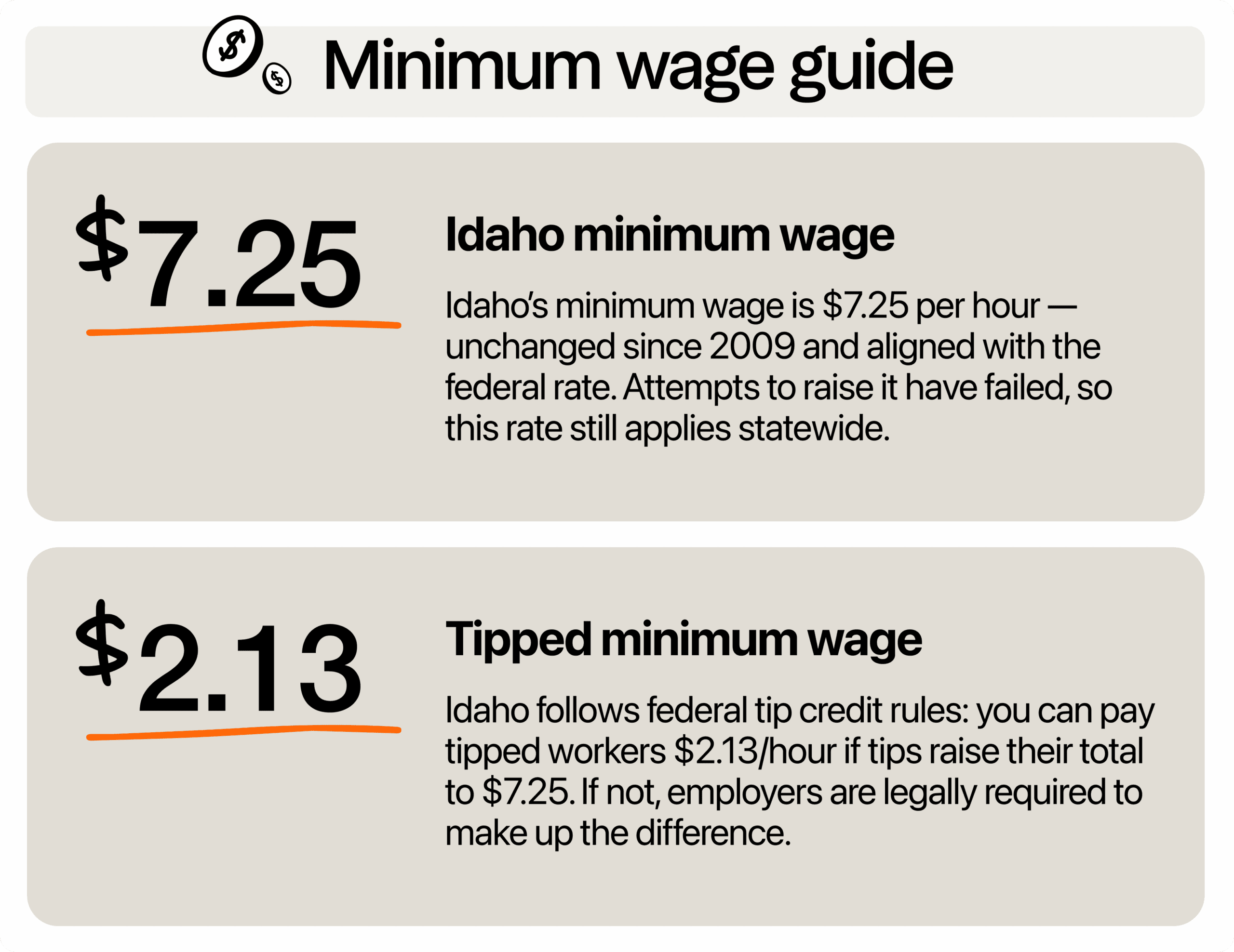Starting a business in Idaho has its perks, such as low taxes, a growing population, and less red tape compared to some other states. In fact, according to the US Chamber of Commerce, in 2023, Idaho saw 31,338 new business applications, reflecting a 10.1% increase from the previous year. This surge indicates a vibrant entrepreneurial spirit and a supportive environment for startups.
If you’re opening a coffee shop in Boise or launching a franchise in Coeur d’Alene, you must monitor labor costs, and that starts with knowing the current minimum wage in the state.

What is the minimum wage in Idaho?
As of 2026, the Idaho minimum wage is $7.25 per hour. That number might look familiar because it’s the same as the federal basic minimum wage, which hasn’t changed since July 24, 2009. In short, while almost half the states in the U.S. raised their minimum wages this year, Idaho did not.
Idaho lawmakers have seen multiple efforts to increase the minimum wage, including a 2025 bill that proposed bumping it up to $12 per hour. The bill failed to pass due to strong pushback from various business associations and conservative legislators. The main argument? Raising wages could put extra strain on small businesses, many of which operate on slim margins.
For business owners like you, the current minimum wage might initially seem like a relief. Every dollar matters when you’re launching a new venture, and paying lower wages can help stretch your startup capital further. It might feel like one less thing to worry about while you’re juggling inventory orders, utility bills, and figuring out your marketing plan.
But here’s the reality: wages aren’t just a line item on your expense sheet. They’re tied directly to your team’s motivation, retention, and overall quality of service. Sure, Idaho’s laws allow you to pay the federal minimum of $7.25 an hour, but relying on that alone can lead to higher turnover, burned-out staff, and more headaches down the line.
Why is Idaho’s minimum wage so low?
If you’re thinking of owning a bar, restaurant, or you’re already running one, it’s natural to ask why the minimum wage here is still so low. The answer lies mostly in how the state approaches business and regulation. Idaho tends to keep government intervention minimal, especially when it comes to how employers set wages. This approach is meant to keep business costs low and attract entrepreneurship, which is why Idaho’s wage rate increase proposals often stall in the legislature.
But here’s a key piece of information that business owners appreciate: Idaho gives small business owners some breathing room. According to the most recent data on the Gem State from the US Census Bureau:
- The average rent for a one-bedroom apartment in Idaho is around $823, well below what you’d pay in bigger metro areas. That translates into lower commercial lease rates, especially outside of major hubs like Boise.
- Cities like Pocatello offer a cost of living 10.55% lower than the state average and 10.8% below the national average. Such affordability can be advantageous for business owners seeking to establish operations in cost-effective locations.
- Utilities come in at around 10% less, helping keep your fixed expenses manageable for powering whatever you need: a café, bakery, or walk-in fridge.
- General expenses like groceries and transportation are relatively below the national norm.
That means your overhead costs are lower, and even if you’re paying above minimum wage, your payroll doesn’t balloon the way it might in a state like California or New York. Just be mindful: booming areas like Boise are seeing rising rents and demand, so plan for gradual increases depending on your location. However, overall, Idaho still offers a cost-efficient environment for new and growing ventures.
How does Idaho’s minimum wage compare to other states?
Idaho is one of just 20 states that continue to follow the federal minimum wage of $7.25 per hour. For business owners, especially those planning to grow or hire for the first time, it’s helpful to understand how Idaho compares to surrounding states and national trends.
| State | Minimum Wage (2026) | Notes |
| Washington | $17.13/hour | Highest in the nation |
| California | $16.90/hour | Includes strong labor protections |
| Connecticut | $16.94/hour | Adjusts annually with the cost of living |
| Colorado | $15.16/hour | Progressive increases tied to inflation |
| Nevada | $12.00/hour | Recently updated with worker-friendly reforms |
Now, what do all these states have in common? Most of them have built-in wage increases that adjust every year based on inflation or cost-of-living changes. But in Idaho? It hasn’t touched the minimum wage since 2009.
From a business standpoint, this can seem like a plus: lower server salaries or wages mean lower overhead, especially in labor-heavy industries. But there’s a flip side you can’t ignore. With many states around you offering higher wages, you may face a harder time hiring or keeping great employees, especially if they’re comparing job opportunities across state lines or online. If you’re thinking of hiring remote staff, expect to pay more competitive rates to stay in the running.
Even for local hires, many workers are aware of what they could be making just across the border or in other states, so offering strong wages or standout benefits can help you win and keep the best people.
Is it worth starting a business in Idaho?
The short answer is—absolutely! If you’re considering launching a business with low overhead, Idaho remains one of the most business-friendly states in the U.S.
Dan Caldwell, General Manager of Dot Foods’ Idaho facility, said, “Doing business in Idaho has had a major impact on our success as a company,” citing the community and Burley’s exceptional talent pool as top reasons for their expansion into the state. That kind of endorsement says a lot. When established companies thrive because of the local environment, it means you’re stepping into a state that welcomes business with open arms.
Consider these as factors why:
- Fewer regulations mean you can set up your business more quickly and with fewer bureaucratic hurdles.
- Lower operating costs allow you to stretch your startup capital further, giving you more flexibility in your initial investments.
- Tax incentives are available for certain industries and job creation, providing additional financial benefits.
- Booming sectors like food service, logistics, and construction make Idaho a place of real growth and opportunity.
Let’s say you’re planning to open a small restaurant. In Idaho, you’ll benefit from lower costs in rent, utilities, and wages compared to most urban areas in the U.S. Plus, Idaho’s restaurant industry is thriving as it brings in more than $12 billion a year and supports over 100,000 jobs, according to the National Restaurant Association.
Take The Fork in Boise, for example. This locally-owned restaurant has built a strong reputation by focusing on locally-sourced ingredients and providing excellent customer service. Their success demonstrates how a well-executed concept can thrive in Idaho’s supportive business environment.
That said, just because wages are low doesn’t mean you should ignore what your employees need. A good business isn’t just about saving money, but it’s about building a strong team. Pay attention to what people value, and you’ll set your business apart. Offering competitive wages, benefits, and a positive work environment can lead to higher employee satisfaction and retention, which ultimately contributes to your business’s success.
2026 Labor Costs Playbook
Increase your bottom line with insights from over 500 restaurant pros—learn the true cost of employee turnover, the best way to manage labor costs, and proven strategies to protect profits.

How to offer fair and livable wages in Idaho
Idaho doesn’t require you to go above the state-specific minimum of $7.25 per hour, but as a business owner, building your entire pay strategy around the minimum might limit your potential more than you think. When employees feel appreciated, they go above and beyond. They’re more likely to stick around, give great service, and bring energy to your business every day. That’s the kind of team you want backing you.
So, how do you make that happen, especially when you’re balancing startup costs?
- Start by paying above the minimum. Even raising wages to a $10 to $12 per hour rate can help you attract more reliable, skilled workers. In the restaurant world, where competition for good staff is fierce, that extra few dollars an hour plus tips can set you apart.
- Offer real perks. You don’t need a Fortune 500 budget to offer meaningful benefits. Think paid time off, wellness support, or shift meals. Even something as simple as letting your employees eat for free during breaks builds goodwill.
- Stay flexible. Adaptable scheduling is a big deal, especially for part-time workers, students, or parents juggling multiple responsibilities. That’s where smart payroll solutions come into play. Tools like 7shifts go beyond just shift scheduling. For any business owner trying to build a strong, sustainable team in Idaho, it’s the kind of support that can make your life a whole lot easier.
- Create paths to grow. People don’t just want a paycheck; they want a future. As an employer, show your team there’s room to move up by promoting from within or offering learning opportunities. A dishwasher today could be your next shift lead or manager.
And if you’re still working with a tight wage budget? That’s okay. Just make up for it in other ways. Foster a positive culture. Create an environment where people feel safe, respected, and excited to come to work. Those values stick with people, even when the paycheck is on the modest side.
At the end of the day, how you treat your employees shapes your business from the inside out. Build a workplace that people talk about (for the right reasons), and you’ll never struggle to fill a job posting.
What happens if Idaho raises the wage rate in the future?
Legislation didn’t pass in 2025, but minimum labor wage increases are always on the table, especially as surrounding states continue raising theirs. As a small business owner, it’s smart to think a few steps ahead so you’re not caught off guard if Idaho decides to follow suit.
Here are some ways to stay prepared:
- Track your labor-to-revenue ratio. Know how much of your income is going to wages now so you can model what a $10 or $12 per hour wage floor would look like in the future.
- Build flexibility into your pricing. If a wage hike becomes law, having some room to adjust your menu prices gradually will soften the impact.
- Document your workflow and labor needs. This helps you make smarter decisions about staffing without overworking your team.
The idea isn’t to stress about what might happen. It’s about being ready so that if (or when) Idaho bumps the wage, you’ll already have a plan in place, and your business won’t miss a beat.
Idaho’s minimum wage: low on paper, big on potential
Idaho’s minimum wage hasn’t changed in over a decade, but the state remains a hotspot for entrepreneurs looking for low startup costs, employment, and pro-business policies. The low wage might look like a benefit, but your long-term success will depend on how you treat your team.
If you’re opening a business in Idaho, especially in people-first industries like food service, consider paying above the minimum, offering meaningful benefits, and creating a workplace where people want to stay. The talent you attract and keep will always be worth the investment, and when your systems are running efficiently behind the scenes, it’s easier to focus on what matters most: your people and your customers.
Minimum wage resources

Rebecca Hebert, Sales Development Representative
Rebecca Hebert
Sales Development Representative
Rebecca Hebert is a former restaurant industry professional with nearly 20 years of hands-on experience leading teams in fast-paced hospitality environments. Rebecca brings that firsthand knowledge to the tech side of the industry, helping restaurants streamline their operations with purpose-built workforce management solutions. As an active contributor to expansion efforts, she’s passionate about empowering restaurateurs with tools that genuinely support their day-to-day operations.
